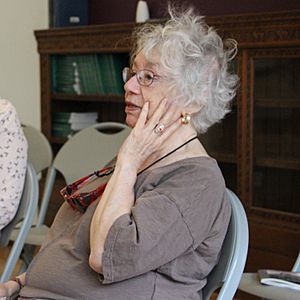Dorothy Zellner facts for kids
Quick facts for kids
Dorothy Miller Zellner
|
|
|---|---|

Zellner in 2019
|
|
| Born | 1938 (age 87–88) |
| Nationality | American |
| Alma mater | Queens College, City University of New York |
| Occupation | Civil rights activist |
| Spouse(s) | |
Dorothy "Dottie" Miller Zellner (born in 1938) is an American activist, writer, and editor. She has worked to protect human rights and support equal rights for women. Dottie was an important part of the Civil Rights Movement in the 1960s. During that time, she helped find people to join the Freedom Summer project. She also helped edit Student Voice, which was a newsletter for the Student Nonviolent Coordinating Committee (SNCC). Today, she is active in a movement that supports the rights of Palestinians.
Contents
Early Life and Inspiration
Dottie Zellner was born in Manhattan, a part of New York City. Her parents were immigrants who came from other countries. They spoke Yiddish, a language often used by Jewish people. Her parents taught her a lot about Black history, fairness for all races, and how people can work together for a better society. They also taught her about Jewish people who resisted unfair treatment during World War II. Dottie says that her parents' focus on social justice inspired her to join the Civil Rights Movement. She later graduated from Queens College.
Working for Change
Designing the Black Panther Party Logo
In 1966, Dottie Zellner helped create the famous logo for the Black Panther Party. This group worked for the rights of Black people. A leader named Stokely Carmichael asked her to get ideas from a panther at Zoo Atlanta. Dottie's husband, Bob Zellner, and another SNCC member took pictures of a panther. Dottie then made a drawing. Carmichael asked her to try again, using a rough sketch from another SNCC member, Ruth Howard. Ruth's drawing was based on the mascot of Clark Atlanta University. In 1967, Dottie's second drawing became the official logo for the Black Panther Party.
Ideas About Women's Rights
In 1969, Dottie Zellner worked for the Southern Conference Educational Fund (SCEF). She wrote a paper that discussed groups where women talked about their feelings and experiences. Dottie thought these groups were more like "therapy" and not focused enough on political action. In response, another SCEF member named Carol Hanisch wrote an essay. This essay was later published in a book and became very famous. It was called "The Personal is Political." This idea means that personal experiences, especially for women, are connected to bigger political and social issues.
Later Career and Activism
Dottie Zellner worked as a nurse for several years. In 1984, she joined the Center for Constitutional Rights, an organization that works to protect people's rights. Later, in 1998, she became the director of publications and development for Queens College School of Law.
After hearing a talk by an Israeli peace activist in 2002, Dottie became involved in efforts to bring peace between Israelis and Palestinians. Since 2002, she has traveled to Israel and Palestine many times. She has volunteered with Physicians for Human Rights, a group that helps people get medical care. She also supports the Boycott, Divestment and Sanctions (BDS) movement, which aims to pressure Israel to change its policies.
See also
- Black Panther Party
- Lowndes County Freedom Organization
- The personal is political
 | Misty Copeland |
 | Raven Wilkinson |
 | Debra Austin |
 | Aesha Ash |

